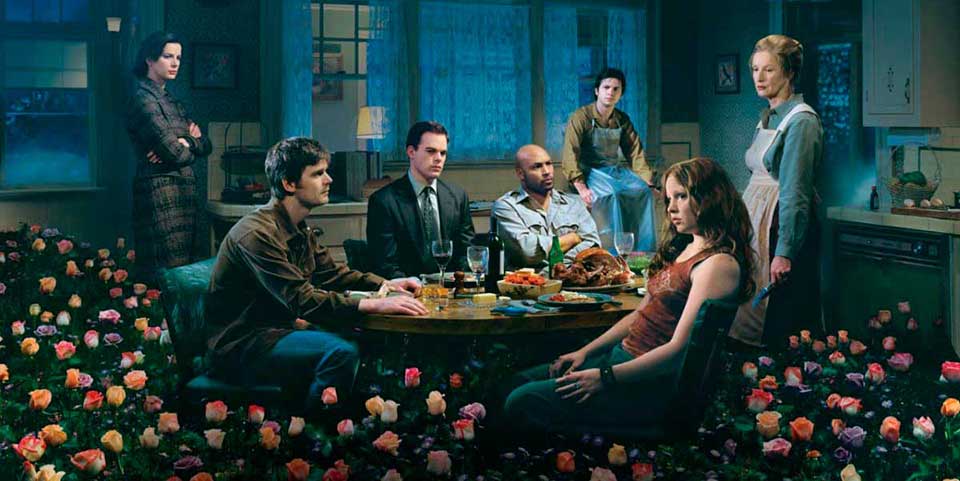
The dead to the well and the living to the hole: between entertainment and feast, with domestic respect and public irreverence, the parties of the dead seem a mockery of the uncertainty in the face of life
Elisa Ramírez Castañeda. Sociologist
The Shiva tradition, which takes place the next seven days after the funeral, is a long family gathering where the members spend time sitting in an attitude of contemplation on death, during that time abundant food is served. The family is visited by close friends and relatives who contribute additional dishes. They are served as buffets and eating is a great consolation in mourning, according to Jewish custom.
In Japan, as in other countries that practice Buddhism, it is customary to incinerate the body of the deceased, the bereaved wait and sometimes watch the long cremation process. Aided by chopsticks, they recover the fragments of bones that leap from the burning pyre and place them in a bowl, at the end, they place that bowl of bones together with another full of rice, as an offering next to the ashes of the dead.
In Tibet, the population is mostly Buddhist, but they cannot have cremations according to tradition, due to the scarcity of firewood in the snowy Himalayas. They leave the body in the open in the mountains, wrapped in a white sheet and a ceremony is performed in which the Lamas help the soul to travel outside the body, in the end, the body is left as food for the vultures, this process ensures a good karma for the dead.
The nation of the Gypsies, present throughout the world, has the tradition of leaving the body of the deceased without embalming for three days after the death in the open coffin, thus receiving visits from friends and family. The dead person should not be left alone at any time, there is never a lack of food and wine that is offered to visitors and the dead person is left a bottle of water nearby, in case they were thirsty on their way to eternity.
In Islam, tradition indicates that the dead are buried no more than 24 hours after death, wrapped in sheets and with senses cries of pain that accompany him to his grave without a coffin, to be in eternal bond with the earth. Relatives visit relatives of the deceased, bring them food and make a brief visit. Forty days or a year after the funeral, at the Mevlit ceremony, family and friends meet again and hold a great banquet in honor of the deceased.
To this day, it is the special work of women of many cultures, washing bodies, shrouding and then cooking at funerals. They are jobs that seem linked out of generosity with the deceased who seems defenseless and out of gratitude to those who attend the funeral, some make long trips to attend and are offered food. The food comes from traditional recipes of each country, which leaves good memories. In some towns in Spain and Mexico, relatives and friends help with the expenses of the funeral and food to spend the following days in which the bereaved will be protected by the mourning.
In Xochimilco, Mexico, the dying man plans his funeral and what he is going to eat that day, those who are in charge of organizing it avoid cooking food of animal origin, out of respect for the perishable meat of the deceased. Friends and neighbors of the deceased’s family help with the banquet and burial expenses. The deceased is honored to have a dignified funeral and it is through the meal that a farewell ritual is established, common to almost all religious beliefs in the world.
Western funeral customs were influenced by the traditions of Ireland and Great Britain, they are identified by the abundant food after the funeral, served in the form of a large buffet, where alcohol is unavoidable. The cinema of the United States and television series such as Six Feet Under or The Casketeers, have influenced the funeral customs of the world, because they seek services adapted to the preferences of the bereaved or perhaps, to the wishes in life of the deceased . Banquet and decoration services are hired, sometimes accompanied by music.
The thanatologist Frank Ostaseski in his book The Five Invitations (2017), USA: Macmillan, recounts conversations with those who are going to die about food, especially since most are in a condition of food restriction, however, their faces They light up when they remember their favorite dishes and from there they relate a series of family memories and joyful moments that they will miss.
At Del Pueblo Funeral Home, in addition to our stories, we offer you various comfortable possibilities to support family and friends in the farewell of a loved one, in addition to our ecumenical spiritual vision, that is why at all times, we make the most difficult moments easy.
